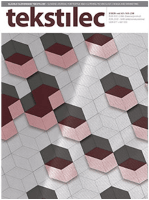
Tekstilec
Scope & Guideline
Unraveling the threads of multidisciplinary textile research.
Introduction
Aims and Scopes
- Textile Materials Development:
Investigating new textile materials, including natural and synthetic fibers, and their applications in various industries such as automotive, fashion, and medical. - Sustainable Practices and Innovations:
Exploring eco-friendly methodologies in textile production, dyeing processes, and waste management to promote sustainability within the textile industry. - Functional and Performance Properties of Textiles:
Analyzing the physical, mechanical, and comfort properties of textiles, including their suitability for specific applications like sportswear, medical garments, and everyday clothing. - Technological Advancements in Textile Processes:
Researching advancements in manufacturing processes, including automated systems, computer modeling, and 3D printing technologies to enhance efficiency and quality in textile production. - Consumer Behavior and Market Trends:
Studying consumer perceptions, behaviors, and market dynamics related to textile and apparel products, focusing on sustainability and fast fashion implications.
Trending and Emerging
- Artificial Intelligence in Textiles:
The application of artificial intelligence in optimizing textile production processes and enhancing design capabilities is rapidly growing, reflecting technological advancements in the industry. - Sustainable and Eco-Friendly Innovations:
A marked increase in research addressing sustainability, including waterless dyeing methods and the use of biodegradable materials, aligns with global environmental concerns. - Health and Safety in Textiles:
The development of textiles for medical applications, including antimicrobial and antiviral properties, is gaining attention, particularly in response to increased health awareness. - Consumer Awareness and Fast Fashion Dynamics:
Research exploring consumer attitudes towards sustainability in fast fashion is trending, highlighting the importance of consumer behavior in driving industry changes. - Smart Textiles and Wearable Technology:
There is a growing interest in smart textiles that incorporate technology for enhanced functionality, catering to diverse applications from healthcare to sports.
Declining or Waning
- Traditional Textile Production Techniques:
Research focused on conventional textile production methods has seen a decline, likely due to the increasing emphasis on innovative and sustainable practices. - Basic Textile Properties Analysis:
While foundational studies on basic textile properties remain important, there is a noticeable shift toward more complex analyses involving multifunctional and smart textiles. - Non-Eco-Friendly Dyeing Methods:
Research on traditional dyeing processes that do not consider environmental impacts is becoming less frequent, as there is a growing preference for sustainable and innovative dyeing solutions. - General Textile Historical Studies:
Papers focusing on historical aspects of textiles and their cultural significance have decreased, overshadowed by more applied and technical research themes.
Similar Journals
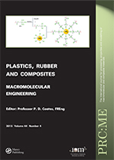
PLASTICS RUBBER AND COMPOSITES
Advancing the Future of Materials SciencePLASTICS RUBBER AND COMPOSITES is a leading academic journal published by SAGE Publications Inc., dedicated to advancing the understanding and application of polymers, plastics, and composite materials. With an ISSN of 1465-8011 and an E-ISSN of 1743-2898, this quarterly publication attracts a diverse readership from the fields of ceramics and composites, chemical engineering, materials chemistry, and polymer science. Currently indexed in the Q3 category across multiple relevant domains, the journal provides a platform for high-quality research and innovations that contribute significantly to material science. The journal's commitment to disseminating cutting-edge research makes it a valuable resource for researchers, industry professionals, and students who are eager to explore the latest developments and applications in this dynamic field. Despite its current non-open access status, the journal's rigorous peer-review process ensures that all published articles meet the highest academic standards, thus reinforcing its reputation as an essential source for scholarly work in the materials sector.
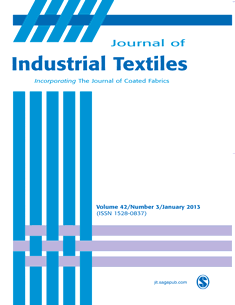
Journal of Industrial Textiles
Transforming Materials Science through TextilesJournal of Industrial Textiles, published by SAGE Publications Inc, is a leading academic journal that focuses on the intricate interplay between textile materials and industrial applications. With a significant impact factor and a strong reputation in the field, it caters to a diverse audience ranging from researchers and professionals to students interested in the advancement of textile engineering, chemical engineering, and materials science. The journal offers invaluable insights into innovative textile processes, sustainable practices, and the latest technological developments as it spans research contributions from 1971 to the present. Notably, it ranks in the second quartile across various categories, including Chemical Engineering and Industrial and Manufacturing Engineering, reflecting its influence and quality in the scientific community. Although it is not an open access journal, the Journal of Industrial Textiles remains a critical resource for advancing knowledge and fostering collaboration within the textile sector and related fields.

Journal of Cotton Science
Connecting Science and Agriculture in Cotton DevelopmentJournal of Cotton Science is a vital publication dedicated to advancing the understanding and innovative practices within the cotton industry. Published by the NATIONAL COTTON COUNCIL OF AMERICA, this journal has been a key resource for researchers, agronomists, and industry professionals since its inception in 1997, with contributions spanning various aspects of cotton science, including breeding, genetics, pest management, and environmental impact. With an ISSN of 1523-6919 and an E-ISSN of 1524-3303, it currently holds a Q3 ranking in the Materials Science (miscellaneous) category as per the 2023 quartiles. While the journal operates without open access, it remains accessible to professionals looking to contribute to its expanding reach. The Journal of Cotton Science plays a pivotal role in disseminating cutting-edge research and fostering collaboration among scientists, positioning itself as an essential resource in the ongoing exploration of cotton's material science applications. Stay up to date with the latest findings and developments that shape the future of this crucial agricultural product.
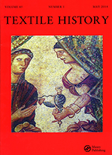
TEXTILE HISTORY
Illuminating the Cultural Tapestry of TextilesTEXTILE HISTORY is a distinguished journal focusing on the rich tapestry of textile development across various historical contexts, published by Routledge Journals, Taylor & Francis Ltd. With origins dating back to 1968, this journal serves as a crucial platform for scholarly discourse in the fields of history, industrial and manufacturing engineering, and business management. It holds impressive rankings, including Q2 in History and ranks within the top 20% in Arts and Humanities, reflecting its significant contribution to understanding the socio-economic and cultural implications of textiles. Additionally, it operates under a traditional access model, ensuring that quality research is preserved within a structured environment. The journal is an invaluable resource for researchers, professionals, and students alike, aiming to advance knowledge and inspire future studies in textile history. Situated in the United Kingdom, the editorial team is committed to fostering a vibrant academic community that engages with the dynamic intersections of textiles, industry, and cultural heritage.

FIBERS AND POLYMERS
Connecting Theory and Practice in Materials ScienceFIBERS AND POLYMERS is a prestigious scholarly journal published by the Korean Fiber Society, specializing in the fields of Chemical Engineering, Chemistry, and Polymer Science. Since its inception in 2000, the journal has provided a dynamic platform for researchers and professionals to disseminate cutting-edge findings and innovative methodologies related to fibers, polymers, and their diverse applications. With its Q2 category ranking across multiple disciplines in 2023 and a commendable standing in Scopus rankings—ranking #183 in General Chemistry and #127 in General Chemical Engineering—it is well-regarded within the academic community. The journal’s commitment to quality research is further underscored by its comprehensive coverage of technological advancements and theoretical developments relevant to both industry and academia. Access to published articles may vary, and authors are encouraged to submit original research to contribute to this evolving field. Join the community shaping the future of materials science through FIBERS AND POLYMERS.

Research Journal of Textile and Apparel
Navigating challenges in fashion through academic excellence.Research Journal of Textile and Apparel, published by Emerald Group Publishing Ltd, serves as a pivotal platform for advancing knowledge in the fields of textile and apparel research. With an ISSN of 1560-6074, this journal has been disseminating quality research since its inception in 1997, and it continues to contribute valuable insights through to 2024. The journal holds a Q3 ranking across multiple categories, including Business and International Management, Industrial and Manufacturing Engineering, Management of Technology and Innovation, and Materials Science, reflecting its commitment to high standards of scholarship. Although not an open-access journal, it provides a vital resource for researchers, professionals, and students eager to explore innovative textile technologies and sustainable practices within the fashion industry. As the textile sector navigates significant challenges and opportunities, this journal is uniquely positioned to foster collaboration and enhance understanding among diverse stakeholders.

FIBRE CHEMISTRY
Innovating the Fabric of Tomorrow through Research and Collaboration.Fibre Chemistry is an esteemed journal published by Springer, focusing on the intricate and evolving field of polymer science and textile engineering. With its ISSN 0015-0541 and E-ISSN 1573-8493, this journal serves as a pivotal resource for researchers, practitioners, and students, highlighting significant advancements and innovations in fibre technology since its inception in 1969. Despite its current positioning in the Q3 quartile across Chemical Engineering, Chemistry, and Materials Science categories, Fibre Chemistry continually aims to bridge the gap between fundamental science and practical application by disseminating high-quality, peer-reviewed research articles. The journal does not currently operate under an open access model, but it provides crucial insights that foster collaboration and drive progress within its field. With the ongoing convergence of technologies and materials, this publication is poised to contribute significantly to the academic discourse surrounding fibre chemistry and its related disciplines until 2024 and beyond.

Fibers
Transforming Research into Real-world ApplicationsFibers is a leading peer-reviewed open access journal published by MDPI, focusing on cutting-edge research within the realm of materials science, particularly in the domains of biomaterials, ceramics and composites, and structural engineering. Established in 2013, the journal has gained recognition for its significant contributions to the field, boasting an impact factor that positions it in the Q2 quartile across multiple categories such as Biomaterials, Ceramics and Composites, Civil and Structural Engineering, and Mechanics of Materials as of 2023. With a Scopus ranking that highlights its prominence—such as in the top 20% in Civil and Structural Engineering—the journal fosters an inclusive platform for academic dialogue and technical advancement. Researchers and professionals can access the journal’s comprehensive articles freely, promoting the dissemination of knowledge that is crucial for the advancement of innovative materials and their applications. Situated in Basel, Switzerland, Fibers continues to be an essential resource for those looking to stay at the forefront of research and technology in material sciences.
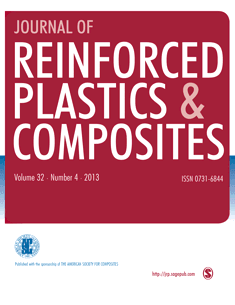
JOURNAL OF REINFORCED PLASTICS AND COMPOSITES
Exploring the Intersection of Engineering and SustainabilityWelcome to the JOURNAL OF REINFORCED PLASTICS AND COMPOSITES, a leading publication in the realms of materials science, engineering, and polymers. Published by SAGE Publications Ltd, this journal stands out with its robust Q2 ranking in multiple categories, including Ceramics and Composites, Materials Chemistry, Mechanical Engineering, and Mechanics of Materials. Since its inception in 1982, the journal has become an essential resource for researchers and professionals, disseminating pioneering research and innovative applications in reinforced plastics and composite materials. Though not open access, subscribers gain exclusive insights into groundbreaking findings contributing to the advancement of the industry. The journal is indexed in Scopus, with notable rankings that reflect its influence and high-quality scholarship. With ongoing coverage until 2024, the JOURNAL OF REINFORCED PLASTICS AND COMPOSITES remains committed to fostering academic dialogues and facilitating advancements in sustainable materials and advanced engineering solutions.
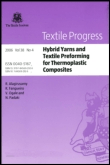
TEXTILE PROGRESS
Pioneering Research in Textile and Material ScienceTEXTILE PROGRESS is a premier academic journal published by Taylor & Francis Ltd, dedicated to advancing the field of textiles and materials science. With an ISSN of 0040-5167 and an E-ISSN of 1754-2278, this journal serves as a vital resource for researchers and professionals interested in the interplay between chemical engineering, industrial processes, and manufacturing technologies related to textiles. Covering a wide scope of topics from 1969 to 2024, TEXTILE PROGRESS has established its reputation within the scholarly community, consistently achieving a Q2 ranking in various categories including Chemical Engineering, Industrial and Manufacturing Engineering, and Materials Science as of 2023. Its impressive Scopus rankings – 121st in Industrial and Manufacturing Engineering and 101st in General Chemical Engineering – reflect its significance and relevancy in the academic landscape. While not an open-access journal, TEXTILE PROGRESS ensures accessibility through its extensive distribution channels, enabling students, researchers, and professionals alike to benefit from cutting-edge research and developments in textile technology and science.